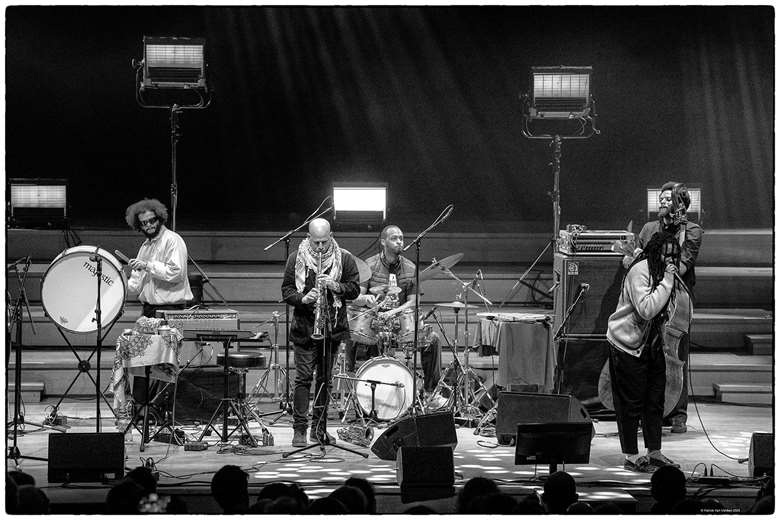Craig Taborn and Irreversible Entanglements fire up Flagey Jazz festival
Kevin Le Gendre
Thursday, January 23, 2025
There’s a bounty of ear-catching jazz names at this top Brussels jazz summit

“Remember Patrice Lumumba!” These are the last words uttered by bassist Luke Stewart as Irreversible Entanglements close a rabble rousing set at the sold out Studio 4, one of the largest concert halls at the multi-purpose venue Flagey, located in the lively area of Brussels of the same name. Nothing is more appropriate given that he is referring to the leader of the Republic of Congo, who was assassinated by local rivals with the complicity of the outgoing Belgian colonial government, the mining industry and the C.I.A, on the very day of the Entanglements’ gig, January 17, in 1961.
It is an anniversary of great modern day infamy. Indeed Lumumba’s power to the people agenda resonates strongly with the politically charged texts of the group’s poet Camae Ayewa. A symbol of unity, resistance and creative verve that is part of a lineage defined by such as Amiri Baraka, Jayne Cortez and Art Ensemble Of Chicago, the band plays an important role in making audiences think as well as engage with a turbulent, tantalizing sound world, and this explosive performance shows progression after a decade of recording and touring. The quintet – drummer Tcheser Holmes, trumpeter Aquiles Navarro and saxophonist Keir Neuringer – creates torridly circular rhythms that shift incrementally as Ayewa varies the form and content of her delivery, sometimes slowing down to single staccato beats, sometimes quickening to fluid speech. The band’s masterstroke is a dramatic swerve in the second half of the set to a pure percussion barrage in which congas, bells, rattles and shakers unleash an earthy Afro-Brazilian vibration that pushes against the formality of a seated audience, many of whom accept the invitation to stand and get loose limbed for the liberation of all.
This is all the more appropriate given that the first half of the ten-day festival featured a screening of Soundtrack To A Coup D’Etat, Johan Grimonprez’s quite remarkable documentary on Lumumba and the fervent responses to Africa’s plight by African and black American musicians. One of the key artists to appear in the movie, alongside Max Roach, Abbey Lincoln, Franco and Miriam Makeba, is Nina Simone, and right on cue British pianist Ashley Henry reprises her emblematic Civil Rights call ‘Mississippi Goddam!’ in a largely soulful set that is part of a lively double bill under the banner of Jazz Re:Freshed. The latest crop of young Brits supported by the London-based talent platform includes Doom Cannon, Kaidi Akinnibi, Isobella Burnham, Allexa Nava and Benjamin Appia, who stand confidently in the lineage of Nubya Garcia, Cassie Kinoshi and indeed Henry.
In fact, UK jazz is well represented at the festival, with Camilla George, Jake Long, Amy Gadiaga and Alina Bzhezhinska and Tony Kofi also making appearances to largely positive responses. Of the Belgian artists I saw in my few days in Brussels pianist Bram De Looze is arguably the most significant as this year’s designated artist in residence. His three projects are all international, and his trio with German bassist Felix Henkelhausen and American drummer Eric McPherson is a notable advert for international collaborations insofar as the group is evenly balanced with no single member dominating. The writing is mostly good, slipping at times into the interesting junction between minimalism and chamber music, though the rhythmic engine also has several turns of ingenuity.

But no international collaboration was as notable as the meeting of the Craig Taborn quartet and the Brussels Philharmonic (pictured above - photo by OlivierLestoquoit), a commission a long time in the making for which Flagey Jazz festival’s artistic director Maarten Van Rousselt should take much credit. One of the key pianists of the past three decades has excelled in solo and trio formats but with bandmembers, double bassist Thomas Morgan, drummer Ches Smith and trumpeter Peter Evans in his immediate radius and a piece orchestra filling the tiered backdrop of the large stage he was able to place his musical personality in a different context. Although a fearsome improviser Taborn is an erudite and subtle composer and that came to the fore in charts that were rhythmically and timbrally inventive, creative an ever-shifting landscape of colours that often had mysterious hues emerging from unexpected blends of strings and woodwinds that complement the quartet’s playing, which is as starkly rigorous as it is instantly malleable.
Taborn takes fewer solos than has been the case in much of his previous work and his ability to create both deeply introspective journeys in sotto voce and surging rhythms that sometimes have a march like potency without its absolute rigidity is ear catching. Drummer Smith adds slivers of glockenspiel on occasion to give a glacial beauty to the palette and the moment he and two timpani players launch into a growling, howling discussion in percussion adds a vivid touch of theatricality to the whole set. The encore sees the quartet fly on ‘Congeniality’ by Ornette Coleman, an artist who was both confrontational and congenial. He is also in Soundtrack To A Coup D’Etat.


